1. Plato
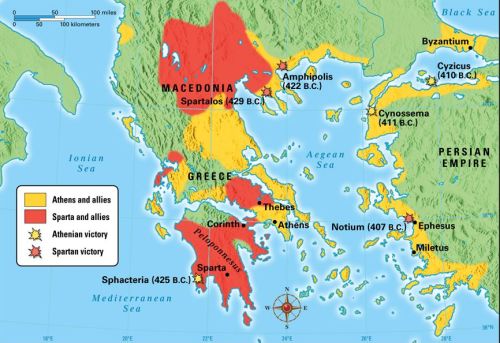
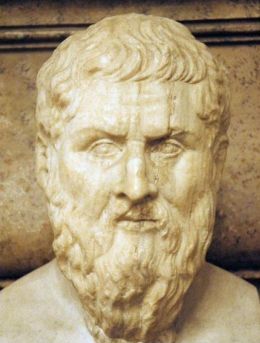
Left: Greece during the Peloponnesian War 431-404 BC. between the democracy of Athens and its allies, which are shown in yellow, and the kingdom of Sparta and its allies, which are shown in red. Photo Slideplayer.
Right: Bust, which is said to represent Plato. He was a child and young man in Athens during the war and actively participated in the last war year 404-403 BC.
Plato was a citizen of the Greek city-state of Athens. In his youth he fought the "Peloponnesian War," which lasted for 27 years. The war was a disaster for the Greek world. Sparta won, but the real winner in the long run was - after a few decades - the northern neighbor of the Greeks, King Philip of Macedonia, who was Alexander the Great's father.
Socrates was Plato's teacher. He was executed in Athens following a demo-cratic popular demand. The accusation was that he corrupted the youth. Plato and his friends were present in his last hours. They watched as their teacher drank the hemlock juice. We note that he was punished for some-thing he had said.
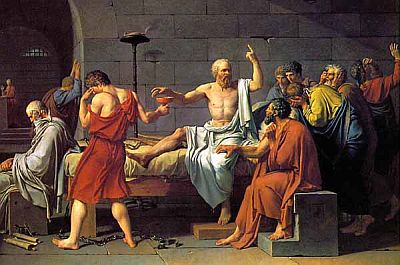
Socrates' death. Painting by David
Plato did not write philosophical treatises with razor-sharp defi-nitions, but dialogues. He belie-ved that everyone deep down knows the truth or at least that they would be able to recognize the objective truth when they were led to it through the right questions and logical arguments. In the dialogue Meno, he thus had Socrates ask a series of questions to a slave boy Meno, who had never studied geometry, and thereby evoked in him an otherwise unconscious knowledge of Euclid's geometry.
His dialogues are populated by historical figures who talk and discuss with each other. In the dialogue "The Republic" appear, for example, the right-eous and honest old businessman Cephalus, his son Polemarchus, the sophist Thrasymachus, Plato's brothers, Glaucon and Adeimantus, and several others. Socrates - with his subtle questions - is Plato's recurring figure.
Many assume that Socrates is a mouthpiece for Plato himself, but he did not allow himself to be easily hung up on certain opinions. He had no pro-blem letting Socrates put forward a point of view in one dialogue and the opposite in another. He has no doubt believed that the logic of a dialogue as a whole points to his message.
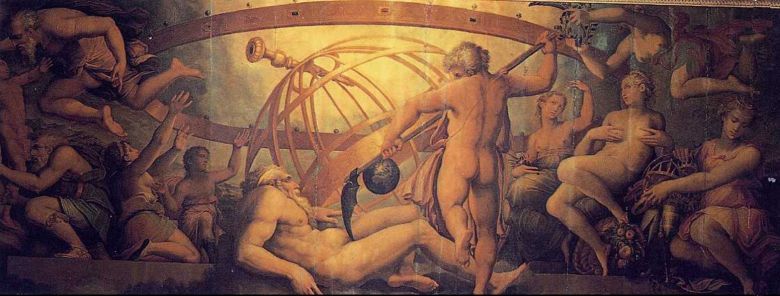
The titan Kronos castrates his father Uranus. This was one of the stories that Plato found unsuitable for bedtime story for children. Hesiod tells that Uranus had eighteen children with Gaia (Earth) - including the Titans, but Uranus hated them and hid them somewhere inside Gaia. Angry and in distress, Gaia urged her children to pu-nish their father. Only her son Kronos was willing. Gaia hid Kronos in "ambush" and gave him a sickle, and when Uranus came to lie with Gaia, Kronos broke out and castrated his father. This enabled Gaia's children to be born, and Kronos (time) became supreme ruler of the cosmos with the Titans as his subordinates. Kronos married Rhea. But Gaia and Uranus had foretold him that one of his children would overthrow him from the throne. Therefore, he carefully de-voured all his children as they were born. But when Zeus was born, Rhea hid him in a cave on Crete and instead gave Kronos a large stone wrapped in cloth, which he swallowed, thinking it was another of Rhea's children. When Zeus had grown up, he magically forced his father to spit out his siblings, and then he defeated Kronos in the great war against the Titans. Fresco by Giorgio Vasari and Cristo-fani Gherardi from around 1560 in Sala di Cosimo in Palazzo Vecchio. Photo Wikipedia.
For example, in the dialogue "The Laws", he lets one of the participants praise freedom of speech "How brave a thing is freedom of speech, which has made the Athenians so far exceed every other state of Hellas in great-ness!".
But in "The State" he uses long passages to let Socrates describe how in his ideal state he will censor away large parts of Greek culture: "Then the first thing will be to establish a censorship of the writers of fiction, and let the censors receive any tale of fiction which is good, and reject the bad; and we will desire mothers and nurses to tell their children the authorised ones only." - "Those, I said, which are narrated by Homer and Hesiod, and the rest of the poets, who have ever been the great story-tellers of mankind." - Their fault? "A fault which is most serious, I said; the fault of telling a lie, and, what is more, a bad lie."
All stories, where the gods laughed at the humans or where the gods were not good, were to be censored away regardless of whether the events were symbolic or not.
Plato is the bedrock of Western philosophy. He founded in practice meta-physics, which is a restless and incessant search for the truth of what is the cause of the phenomena as they appear to us. It has permeated Western philosophy for thousands of years, until the recent emergence of the Frank-furter philosophers, who call their philosophy post-metaphysical, signifying that they do not seek objective truth.
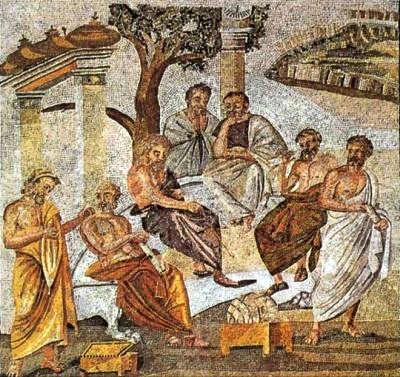
Plato's Academy in Mosaics found in Pompeii. From the villa T. Siminius Stephanus in Pompeii. Photo Wikipedia.
In the dialogue "The State" can be found the utopian original of Cicero's "De Republica", Augu-stine's "City of God", "Utopia" by Sir Thomas More, Dante's pro-posal for world government in "Monarchia" and "The New Atlantis" by Francis Bacon which all are built according to roughly the same model. Authors of utopias, including Plato, must certainly have known that their thought experiments would never be realized in the literal sense, but that the utopias were intended as inspiration and reference.
The "State" also contains the first dissertation on education, from which Milton's, Locke's, Rousseau's, Jean Paul's, and Goethe's theories of edu-cation are legitimate descendants. The sciences of logic and psychology, which have created so many invaluable theories, are originally based on analyzes of Plato's dialogues.
Plato is also the originator of political philosophy. His successors include Thomas Hobbes, John Locke, Montesquieu, Rousseau, John Stuart Mill and Marx. In the dialogue "The State", his discussion participants compare five different forms of government, namely aristocracy, oligarchy, demo-cracy, tyranny and his own utopian ideal state, which, however, was never realized in his time.
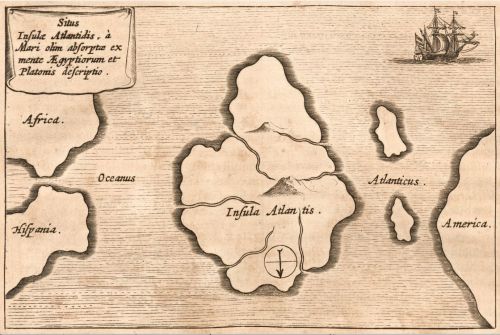
Atlantis is an - possibly fictional - island mentioned in an allegory about the hubris of nations in Plato's dialogues "Timaeus" and "Cri-tias". He described it as founded by Poseidon and located in the Atlantic Ocean and told that the capital was sur-rounded by mighty circular canals with a palace in the center. On this Athanasius Kircher map of Atlantis, the island is located in the middle of the Atlantic Ocean. The map is oriented with the south at the top. Mundus Subterraneus 1669, published in Amsterdam. Photo Athanasius Kircher Wikipedia.
Originally, all Greek states were ruled by kings, who ruled in accordance with ancient laws and performed ancient religious ceremonies, Plato calls it aristocracy. Oligarchy means "minority power" and refers to a form of government that existed in Thebes, among other places, where a few families who married each other exercised political power. Tyranny refers to a state ruled by a dictator who does not allow himself to be limited by old laws and traditions.
In many places in Plato's works, his contempt for democracy shines through. He saw his mentor, Socrates, executed as a result of a Democratic majority decision. In his youth he witnessed the state of Athens repeatedly incurring catastrophic losses in the Peloponnesian War due to unwise de-cisions that the democratic assemblies had been agitated to adopt.
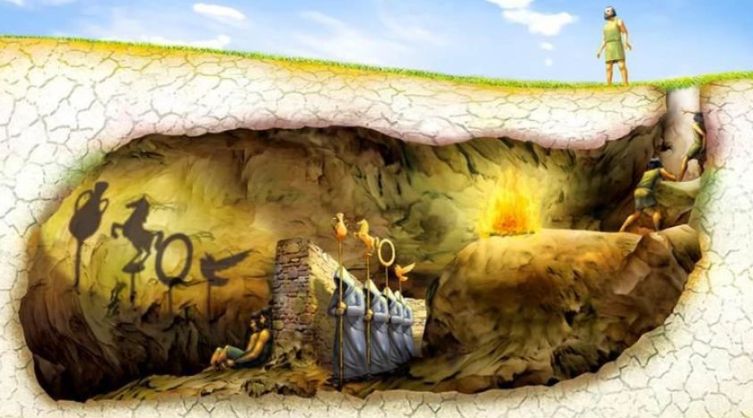
Plato's cave parable: Some prisoners have been chained in an under-ground den since childhood. Their vision is adapted to the dark-ness. They can only look against the wall of the cave. On this wall, shadows of people, animals and things carried by free men are projected. Prisoners do not know that what they see is only shadows of real things, because they have never seen anything but shadows.
A prisoner is released and forced out of the cave. He turns to the sunlight. It hurts in his eyes, and his natural reaction is to want to run back to his safe "shadow reality" (which we can compare to television). But little by little, his eyes get used to the sun-light, and he can now see real people and real things with far more details and colors than the shadows of these things on the wall of the cave.
There are different interpretations of this parable, but in general it is assumed that it has been Plato's opinion that the shadows represent everyday phenomena as they appear to ordinary people, and the real people and things outside the cave in the sunlight repre-sent a more true and higher reality, which only philosophers are able to see - thanks to their wisdom and long education. Photo Imgur.
In modern times, we are witnessing a colossal enthusiasm for the form of government called democracy, which borders on religious worship. How-ever, it is precisely modern mass democracy that has facilitated most cata-strophic decisions, at least one of which has the potential to put an end to Western Civilization, namely the decision to open the borders for Islamic immigration. Therefore, it is entirely appropriate to use Plato to consider whether democracy really is a good idea.
2. The Ideal State
In the description of the ideal state, Plato makes Socrates argue that poli-tical leadership is a skill - in line with, for example, a doctor's skills: "And policy is one among many kinds of skill, - not the skill of the carpenter, or of the worker in metal, or of the husbandman, but the skill of him who advises about the interests of the whole State. Of such a kind is the skill of the guardians, who are a small class in number, far smaller than the black-smiths; but in them is concentrated the wisdom of the State. And if this small ruling class have wisdom, then the whole State will be wise."
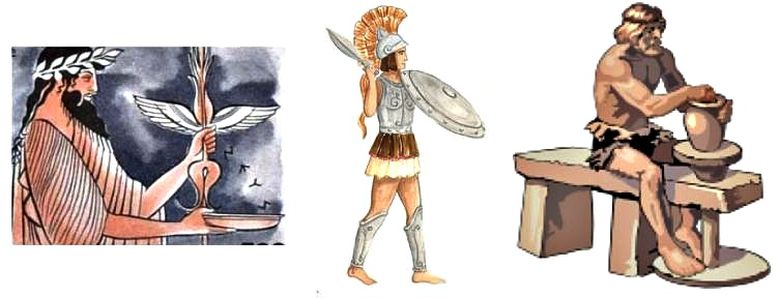
The three estates of Plato's utopian state. To the left the sove-reign rulers, the philosophers, also called guardians, who are a very small group, carefully selected as children and with a very long education in music, gymnastics, geometry, astronomy and dia-lectics. In the middle the guards, who are soldiers and the like, who are also chosen as children, they must be physically strong and brave. To the right a potter, who represents the artisans and mer-chants, they just have to take care of their work and leave the leadership of the nation to the guardians. Photo The Philosophy Site.
The most important question in political philosophy is "Who shall rule?" Plato and Thomas Hobbes believed that the few should lead the nation, while Rousseau, John Locke, John Stuart Mill and Marx held on to the many. Plato's answer to this question was that a small group of specially trained intellectuals would be best suited to govern. He called this view aristocratic, and indeed, the Greek words "ariston" and "kratos" put together mean the rule of the best.
Division of labor is a very important element of Plato's philosophy. He lets Socrates say: "And if so, we must infer that all things are produced more plentifully and easily and of a better quality when one man does one thing which is natural to him and does it at the right time, and leaves other things." - "We may suppose that one man is a husbandman, another a builder, some one else a weaver."
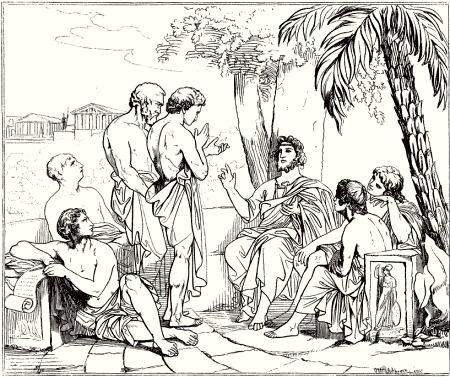
Plato in his academy in Athens, drawn after a painting by the Swedish painter Carl Johan Wahl-bom. Photo Dr Joe Kiff from Svenska Familje Journal Wikipedia.
He concludes that war and the top management of society are also separate tasks that should also be performed by such persons who, due to their personality, are particularly well suited to these jobs and furthermore have relevant education and experience.
The soldiers must be strong and brave, and the leaders must have personality as watch dogs and love learning. Sokrates sayes: "Our city will now require the slight addition of a camp, and the citizen will be converted into a soldier. But then again our old doctrine of the division of labour must not be forgotten. The art of war cannot be learned in a day, and there must be a natural aptitude for military duties. There will be some warlike natures who have this aptitude, dogs keen of scent, swift of foot to pursue, and strong of limb to fight. And as spirit is the foundation of courage, such natures, whether of men or animals, will be full of spirit. But these spirited natures are apt to bite and devour one another; the union of gentleness to friends and fierceness against enemies appears to be an impossibility, and the guardian of a State requires both qualities. Who then can be a guar-dian? The image of the dog suggests an answer. For dogs are gentle to friends and fierce to strangers. Your dog is a philosopher who judges by the rule of knowing or not knowing; and philosophy, whether in man or beast, is the parent of gentleness. The human watchdogs must be philosophers or lovers of learning which will make them gentle. And how are they to be learned without education?"
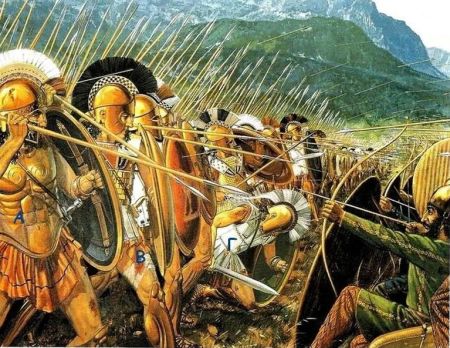
Greek hoplits in battle. The ancient Greek sol-diers were called hop-lites. They fought with the shields edge to edge in a formation called the phalanx. Especially the Spartans were trained that the most important thing was not to be brave but to keep ones place in the formation. When the Spartan king Demaratos was asked why a man is disgraced when he loses his shield, but not when he loses his kyras, he replied that it was because the kyrass was for the protection of the individual, but the shield was for the safety of the whole phalanx. Photo Realm of History.
Plato believes that the soul is an indivisible unit of three parts namely ra-tionality, spirituality and desire. The rational part seeks to make all three parts work together harmoniously in the search for truth. The spiritual part represents such emotions as courage and perseverance. The lustful part represents the desire for food, water, sex, pleasures and probably the unconscious.
In the dialogue "Phaedrus" he uses an analogy with a chariot drawn by two winged horses to describe the relationship between the three parts of the soul: " The human charioteer drives his in a pair of horses; and one of them is noble and of noble breed, and the other is ignoble and of ignoble breed; and the driving of them of necessity gives a great deal of trouble to him."
Plato describes that the three parts of the indivisible soul correspond to the chariot driver, the noble horse and the less noble horse, which also corres-pond to the three estates in his utopian model of society.
The charioteer - the rational part of the soul - represents the guardians, the philosophers, who are the absolute leaders of the state. They are motivated by the search for knowledge and truth. They are also selected as children and have been through a long education in music, gymnastics, mathe-matics, astronomy and dialectics, which enables them to see the reality, the world of ideas, the good, which hides behind everyday phenomena. Their virtues are reason and wisdom.
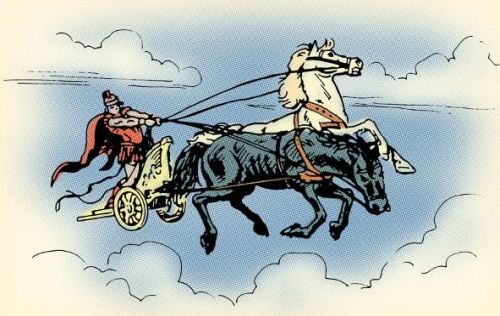
Plato's chariot analogy describes the soul three parts. Unfortunately, the horses are not winged on this drawing. The noble horse - representing spirituality - seeks upward toward light and truth, while the less noble horse - representing lustfullness - seeks downward toward sensuality. The driver - representing rationality - is looking to get the best out of it. Freud followed in his footsteps with also a threefold division of the soul into superego, ego and id. Søren Kierkegaard also described the soul as divided into a basement, living room and first floor. Drawing Art of Manliness.
The noble horse - the spiritual part of the soul - corresponds to the soldiers and probably the police and officials, who are chosen as children. They are motivated by higher emotions, including perseverance, sense of duty, desire for justice and aggression. Their virtue is courage.
The less noble horse - the irrational part of the soul - corresponds to the artisans and merchants. They just have to take care of their work and leave the leadership of the nation to those who have knowledge to do it it. They are motivated by the lower emotions, such as hunger, lust and laziness. Their virtue is moderation.
3. PRO Democracy
We can not get around that the main argument for democracy is that it is a fair system. It is fair and just that those who must pay and live with the decisions must also be the ultimate decision-makers.

American voters waiting pati-ently to come to cast their vote for president.
Yes, but many people are selfish, it is human nature, and leaders, who do not have to be chosen now and then will nurture their own interests and will decide in favor of them-selves. It is better that the people have their foot on the brake and can say stop if the development threatens to get out of control.
It is more important that the na-tions leaders have the correct atti-tudes on the major political issues - climate, equality and a fair distri-bution policy - that are popular with the general population, than that they are qualified in national lead-ership.
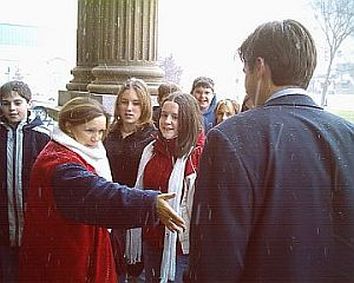
Voters and politicians in dialogue.
The relationship between politi-cians and their voters is not the same as the relationship between a doctor and his patients.
A doctor has a patent on the truth. He knows what is good for his pa-tients. If patients want to get well, they must follow the doctor's re-commendations.
But a politician does not have the same patent on the truth. The vo-ters themselves decide which so-cietal conditions and overall goals will make them happy. Politicians simply need to listen to the voteres and arrange their policies accord-ingly.
This is Plato's fundamental mis-take. In Plato's world, the rulers are a kind of guardians of their subjects because they know what is good for them. In the same way as parents are guardians of their children. But voters are free, ma-ture people in a democratic so-ciety, and they have the right to decide for themselves what will make them happy.

The democratic decision-making process.
After all, Plato's alternative to de-mocracy is that not most, but the best suited should rule. The great majority simply have to concen-trate on their role in societal pro-duction and their own lives.
But we will never be able to live with such a scheme. Every time we see such a superhuman get out of a car with tinted windows and walk into a five star hotel, we will feel a stab in our hearts. We will be reminded that we are only second-class citizens in our own country, a kind of happy practical subhuman.
We would far prefer to be equal men in any malfunctioning demo-cracy rather than to be subhumans in a more effective authoritarian state. Deep in our minds we will never accept being reduced to a kind of servant in our own country.

Female candidate campaigning.
However, it is common knowledge that a democratic form of govern-ment is the recipe of development and prosperity. In Denmark we ha-ve a fairly advanced democracy, which has made us one of the richest countries in the world and many studies have shown that the Danes are also a very happy pe-ople.
3. CONTRA Democracy
That is a wrong criterion. Plato's alternative to democracy is pre-cisely that not the most, but the best-suited, should rule. One should not consider who should have the right to decide. It is more rational to consider who will be able to make the best decisions for the common good of the people.

We would rather be operated on by a trained surgeon, an expe-rienced professional, and not an amateur who has been elected to the job by a democratic majority.
In all private enterprises, in the military and in all other organi-zations, leadership is considered a skill, a discipline that managers need to understand. Nowhere are a company's managers elected by all the company's employees - including cleaning staff and night shifts, who have no knowledge of organization, marketing or product development. How can the leader-ship of the entire nation be a uni-que exception?
Let's imagine we got appendi-citis. Would we then be operated on by a man, who was not a trained sur-geon? A man who was chosen for the job because of his popular atti-tudes toward health care and his confidence-inspiring public appear-ance?
No! We would prefer an experien-ced professional who was really trained in medicine and surgery.
State leadership, foreign policy, and defense are difficult functions, much like surgery. Our prosperity, the future of our children and our whole lives depend on whether the nation's leaders make the right decisions. Should we then leave these difficult tasks to popular amateurs?
In countries with multiple ethnic i-dentities, a democratically elected government will often have its roots in a particular tribe, a par-ticular region, or in a particular race of people. Governments are loyal to their own ethnic roots and grant privileges to their own tribal relatives.
This is precisely the background to the repeated unrest and massac-res in the African democracies.
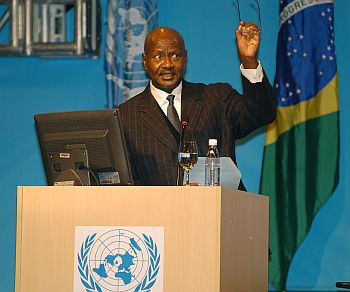
Yoweri Museveni speaks in the UN.
Uganda's President Yoweri Muse-veni wrote: "I am one of those who do not believe in a multi-party de-mocracy. In fact, I am totally a-gainst it, at least as far as Africa is concerned today." - "If you create a multi-party system in Uganda, a party cannot win the elections un-less they find a way to divide the ninety-four percent of the voters (who are peasants), and this is where the main problem arises, tribes, religion and regional affil-iations, which form the basis of intense guerilla activity".
It is not the case that Denmark is wealthy because we have demo-cracy. On the contrary, it is with great certainty the case that we can afford the luxury of having a mass-democracy, precisely be-cause we are wealthy. But the democratic politicians have al-ready, in their zeal to please the voters, whom they themselves have cheered up, made bad deci-sions that will hit us in the future.
It is a great weakness of demo-cracy that its politicians are not able to change course by stepping in front of their constituents and saying: "Listen, friends, we have come on the wrong track, we must do such and such ". It is quite un-thinkable, because then they could risk losing votes.
We have just - in 2020 - been taught by the recent American e-lection that democracy can only work in a homogeneous nation where the people share funda-mental values and respect each other.
Democracy is not possible in a multi-ethnic state divided into intensely rivaling races and reli-gions. There are far too many ways to manipulate an election result that will never be disco-vered.
4. Voters are Ignorant and Unqualified
Today, it is common to compare the state with a ship. One can talk about this and that prime minister standing at the helm, or that he or she replaces another at the helm. In China, Mao was flattered with the title "the great helmsman".
Plato was the first to resemble the state on a ship. In the dialogue "The State" he wrote: "Imagine then a fleet or a ship in which there is a captain who is taller and stronger than any of the crew, but he is a little deaf and has a similar infirmity in sight, and his knowledge of navigation is not much better. The sailors are quarrelling with one another about the steering, every one is of opinion that he has a right to steer, though he has never learned the art of navigation and cannot tell who taught him or when he learned, and will further assert that it cannot be taught, and they are ready to cut in pieces any one who says the contrary."
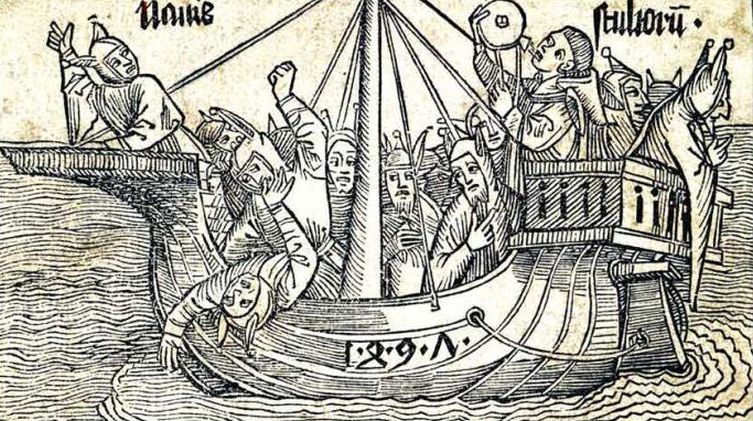
Illustration in "Ship of fools" by Sebastian Brant by Albrecht Dürer from 1494. Photo Literary Kicks.
"They throng about the captain, begging and praying him to commit the helm to them; and if at any time they do not prevail, but others are preferred to them, they kill the others or throw them overboard, and having first chained up the noble captain's senses with drink or some narcotic drug, they mutiny and take possession of the ship and make free with the stores; thus, eating and drinking, they proceed on their voyage in such manner as might be expected of them. Him who is their partisan and cleverly aids them in their plot for getting the ship out of the captain's hands into their own whether by force or persuasion, they compliment with the name of sailor, pilot, able seaman, and abuse the other sort of man, whom they call a good-for-nothing; but that the true pilot must pay attention to the year and seasons and sky and stars and winds, and whatever else belongs to his art, if he intends to be really qualified for the command of a ship, and that he must and will be the steerer, whether other people like or not - the possibility of this union of authority with the steerer's art has never seriously entered into their thoughts or been made part of their calling."
"Now in vessels which are in a state of mutiny and by sailors who are mutineers, how will the true pilot be regarded? Will he not be called by them a prater, a star-gazer, a good-for-nothing?"

Plato and Aristotle in excerpts from Raphael's painting "The School of Athens" in the Vatican. Photo Raphael Wikipedia.
It's easy to see that the ship represents the state, the captain represents the old king, who has seen better days, the crew are the common people in the state, who hunger for democracy - today we will call them the voters - and do not even know that there exist such a thing as navigation. Their leader in the mutiny is a typical politician, who is completely familiar with the game of power, but knows nothing about navigation. He and his followers even claim that "it (navigation) cannot be taught, and they are ready to cut in pieces any one who says the contrary." - But "the true pilot", who has the sense to navigate the sun and the stars and take advantage of the direction of the wind, is the philo, which the mutineers and especially their leaders will avoid at all costs as helmsman.
Plato described how the scholars of his days, the Sophists, were experts in manipulation. We recognize the modern politicians who are ready to jump on any wave to increase their votes. In the "State" he compared the people, the voters, to a large and strong animal, which was cared for, nurtured for and fed by the manipulators: "Further, I would have you consider that the hireling Sophist only gives back to the world their own opinions; he is the keeper of the monster, who knows how to flatter or anger it and observes the meaning of his inarticulate grunts. Good is, what pleases him, evil what he dislikes; truth and beauty are determined only by the taste of the brute. Such is the Sophist's wisdom, and such is the condition of those, who make public opinion the test of truth, whether in art or in morals." (The Republic)
When you sit and look at the results on an election night and notice that after 20% of the votes have been counted, the result can be predicted with reasonable certainty, then you have to think that the mass of the voters is really a big animal, whose grunt and habits show its mood and intentions.
5. PRO Democracy
It is not the case that people who have a long theoretical education will always be better leaders or ru-lers than people who do not have such an education.
One can point to many examples of politicians who have come more or less directly from the University to the Parliament, and they have never achieved anything special. They lack real-world experience.
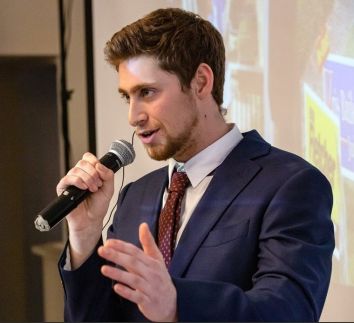
Young politician.
Moreover, men can only become good leaders when they have ex-perienced defeat and adversity in their lives and careers, because only then will they really realize that they are facing the relentless and pedantic reality, and that kind of experience is not gained at the University.
Further, it is not a good idea to gi-ve a regent absolute power. As one Lord Acton has remarked: "Power tends to corrupt and ab-solute power corrupts absolutely".
We saw it with the absolute Danish king Christian 4. who was a great king, who had many good inten-tions with Denmark and Norway.
He built factories, new ports and market towns, but in the long run he could not resist the flattery which he was incessantly sur-rounded by throughout his life.
He ended up considering himself a kind of Protestant pope who was to save Christianity by defeating the emperor in the Thirty Years' War in Germany, which ended very badly for Denmark.
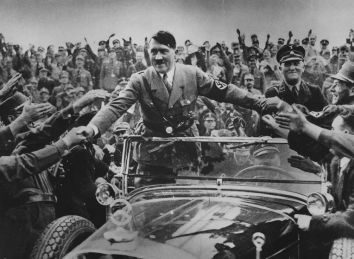
Adolf Hitler surrounded by a jubilant crowd. Photo Pinterest.
Adolf Hitler is another good ex-ample of power corrupting. He started terrific by freeing Germany from the Versailles Treaty's provi-sions on big payments to the vic-torious powers in WW1 and much more.
When he conquered France in a few weeks, after France itself had declared war, he could go on the water.
But especially his personality could not in the long run resist the result-ing flattery and führer-worship. He ended up making excessively dra-matic decisions, thereby present-ing himself as the genius leader who solved difficult problems in one swoop - to the detriment of the German people.
But because you does not have a long theoretical education, you does not have to be stupid. Spend-ing decades in schools and edu-cational institutions, detached from practical reality, does not necess-arily qualify as one of society's top leaders. It is not an absolute ad-vantage to have spent half of one's life in a protected university enviro-nment.
Experiences from real-life practice with real people, empathy and good communication skills, often prove to be more valuable than a large sum of theoretical knowledge of law and justice.
There are successful democracies that are successful precisely be-cause they do not give free rein for all possible degenerate freedom movements. Which suggests that democracies will not necessarily end up in chaos and then be re-placed by tyrannies, as Plato pre-dicts.
The former president of Singa-pore, Lee Kuan Yew, has stated that such disciplined states as his own Singapore and South Korea have enjoyed high growth, pre-cisely because they have stable governments and does not give free rein to advanced democracy and tolerance.
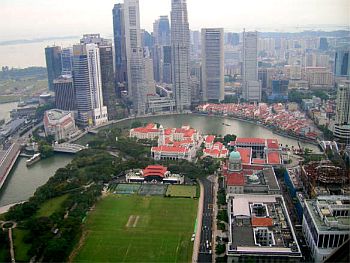
Singapore.
Singapore has very strict rules. It is not allowed to chew gum, it mess. An American teenager was sentenced to 50 strokes with a bamboo stick saturated with water for vandalizing the paint on parked cars.
When Lee Kuan Yew became Pri-me Minister in 1959, Singapore was a poor malaria infested former English colony. Today it is one of the richest countries in Asia. He re-signed in 1990, but remained in government as senior minister.
5. CONTRA Democracy
Thucydides was one of Plato's contemporaries. He wrote the story of the Peloponnesian War. His clear message was that Athens lost the war because it was a de-mocracy. The voters in Athens were too easily aroused to unwise actions, which led to unnecessary losses, humiliations and defeats.
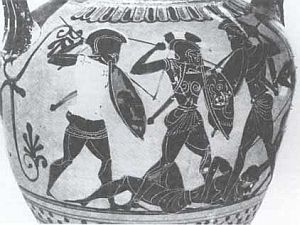
The Peloponnesian War on Greek vase.
Far more than 80% of modern voters are only passing on a su-perficial and superficial interest in the nation's problems and cast their votes ruled by fleeting sym-pathies and anti-parties with the nominated candidates, their per-sonality, gender and appearance.
Women use the election as a wea-pon against the enemies of femi-nism, the evil white men; they go to the polls determined to show that they do not have to decide everything!
Left-wing voters are using the elec-toral process to hit the rich.
All men rival about women's love, and male voters may feel an unconscious dislike towards a candidate who is a man in his prime - because he is a rival.
When we allow the most popular, but less qualified, to rule, they will make mistakes, which we see in a-bundance today.
The politicians have allowed the is-lamic immigration, which can cost the Danes their land or, as a mini-mum, create death and destruction in a not-too-distant future. They have led the people to believe that - among all possible factors - CO2, which is found to be quite a neg-ligible part of the atmosphere - namely 4 tens of thousands - is all-important for the development of the climate and they have further preached that it is the sins of the humans that it may have been a little warmer in the last few deca-des. And for that reason, Denmark plastered with wind turbines, which produce only 8.5% of the electricity supply - that is when the wind blows.
In recent historical times, a large number of fatal political decisions have been made by democratically elected politicians. Probably pre-cisely because they were elected and therefore far too sensitive in relation to transient moods among voters.
The Danish king ruled from ancient times as king of Denmark and du-ke of Schleswig, Holstein and Lauenburg. In 1848, the people's demand was for a democratic and united Denmark. This meant that Slesvig should be Danish, while Holsten and Lauenborg should be left to the German Confederation. Under threat of revolution, the politicians made the king accept the demands.
But Slesvig and Holsten wanted to remain united and keep the Danish king as their duke and represen-tative in the German Confedera-tion. When they heard that the king had been replaced by a "mob rule" - which was the new democratic constitution - they immediately re-belled. Which led to the First Sles-vig War, which after heavy losses ended staus quo.
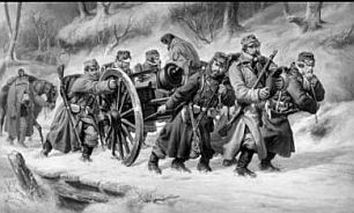
The retreat from Danevirke in 1864. Painting by Niels Simonsen.
But in 1864, the democratic Danish politicians broke the London peace treaty by proclaiming yet another constitution, which also included Slesvig, but not Holsten. This gave Bismarck a pretext to resume the war and Prussia and Austria de-feated Denmark in only three months. The Danish politicians had not made any significant military preparations.
A democracy favors deviant per-sonality types. The leaders are appointed by voters' associations and other political parties. Before a candidate can run in the national elections for the country's leader-ship, he must for years have wor-ked his way up through the party organizations fighting against ma-ny other candidates who are also running for a political career. It's about making a name for yourself, profiling yourself and making con-nections, all tricks apply and this is an advantage for deviant persona-lity types.
Hitler, Stalin, and Mao similarly worked their way up through wide-ly branched hierarchical party or-ganizations. Adolf Hitler was un-doubtedly a narcissist, Stalin suf-fered from paranoid schizophrenia. Had they been more common personality types, they would never have come this far.
But in a kingdom, the regent - that is, the king - does not have to qua-lify by working his way up through a party organization with pointed elbows and sneaky agreements. There will therefore be a far great-er likelihood that a king will be an ordinary kind and warm-hearted personality.
6. Democracy Leads to Chaos and Subsequent Tyranny
The narrator in Plato's dialogue, "The State", which is Socrates, says in Book VIII that there are four forms of government in Greece, which legally follow each other: "first, those of Crete and Sparta, which are generally ap-plauded; what is termed oligarchy comes next; this is not equally approved, and is a form of government which teems with evils: thirdly, democracy, which naturally follows oligarchy, although very different: and lastly comes tyranny, great and famous, which differs from them all, and is the fourth and worst disorder of a State." Furthermore, he adds his own utopian ideal state as the fifth form of government that succeeds tyranny, but which was not realized in any Greek states.
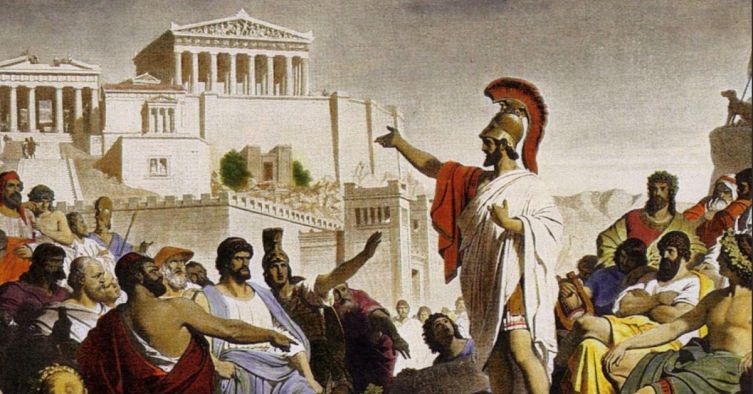
Pericles' funeral speech 430 BC for the Athenians who fell in the first year of the Peloponnesian War against Sparta. Painting by Philipp Foltz 1852. Photo Wikipedia.
The character and personality of the citizens is the reason for the form of government: "Yes, he said, the States are as the men are; they grow out of human characters." It is thus the exact opposite view of Marx, who believes that the character and personality of the citizens is created by the conditions of society - but still a similar logic.
Plato repeatedly lets his figures argue that the character of citizens and especially future leaders is created through education. The path to the per-fect society thus goes through the right education and the right upbringing and influencing of especially the future leaders during their upbringing.
Originally, all Greek states were ruled by kings, as Herodotus tells us. Plato lets Socrates tell how an oligarchy arises: "And so at last, instead of loving contention and glory, men become lovers of trade and money; they honour and look up to the rich man, and make a ruler of him, and dishonour the poor man." - "They next proceed to make a law which fixes a sum of money as the qualification of citizenship; the sum is higher in one place and lower in another, as the oligarchy is more or less exclusive; and they allow no one whose property falls below the amount fixed to have any share in the government."
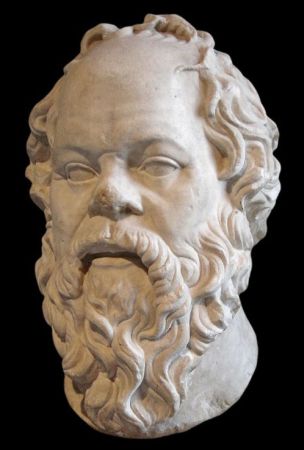
Socrates head made of marble. Roman work from the first century, perhaps a copy of a lost older bronze statue of Lysippos. Thus, it can not be ruled out that it has portraiture. Socrates was executed in Athens at the request of a democratic people. He appears in all of Plato's dialogues except the last one, "The Laws". But, as I said, he died already in Plato's youth at a fairly old age. Photo Sting Wikipedia.
He declares that it is not fair: "Just think what would happen if navigators were to be chosen according to their property, and a poor man was denied permission to steer a ship, even though he was a better navi-gator?"
Sokrates explains: "The inevitable division: such a State is not one, but two States, the one of poor, the other of rich men; and they are living on the same spot and always conspiring against one another."
"The rulers, being aware that their power rests upon their wealth, refuse to curtail by law the extravagance of the spendthrift youth because they gain by their ruin; they take interest from them and buy up their estates and thus increase their own wealth and importance?"
He talks about the causes of the collapse of oligarchs and the emergence of democracies: "A man may sell all that he has, and another may acquire his property; yet after the sale he may dwell in the city of which he is no longer a part, being neither trader, nor artisan, nor horseman, nor hoplite, but only a poor, helpless creature." - "The evil is certainly not prevented there; for oligarchies have both the extremes of great wealth and utter poverty."
"And in oligarchical States, from the general spread of carelessness and extravagance, men of good family have often been reduced to beggary?"
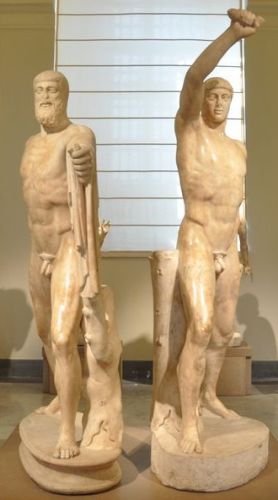
Statues of Harmodius and Aristogeiton who killed the brother of the Athenian tyrant Hippia in 514 BC. exhibited in Cara-calla's Baths in Rome. Foto Livius.org.
"And yet they remain in the city; there they are ready to strike and fully armed, and some of them owe money, others have lost their citizenship; a third class is in both quarters; and they hate and conspire against those who have taken their property, and against all others, and are eager for revolution."
He continues: "the wiry sunburnt poor man may be placed in battle at the side of a wealthy one who has never spoilt his com-plexion and has plenty of superfluous flesh - when he sees such an one puffing and at his wits'-end, how can he avoid drawing the con-clusion that men like him are only rich be-cause no one has the courage to despoil them?"
"And then democracy comes into being after the poor have conquered their opponents, slaughtering some and banishing some, while to the remainder they give an equal share of freedom and power; and this is the form of government in which the magistrates are commonly elected by lot."
"The manner of life in such a State is that of democrats; there is freedom and plainness of speech, and every man does what is right in his own eyes, and has his own way of life."
Plato goes on to let Socrates describe democracy: "And is not their huma-nity to the condemned in some cases quite charming?"
"See too, I said, the forgiving spirit of democracy, and the 'don't care' about trifles, and the disregard which she shows of all the fine principles which we solemnly laid down at the foundation of the city."
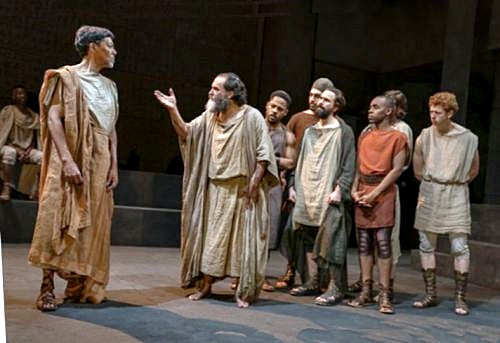
Michael Stuhlbarg (second from left) as the title character in Tim Blake Nelson's play "Socrates", di-rected by Doug Hughes, at the Public Theater in New York 2019. Photo Joan Marcus.
He continues the de-scription of democracy: "The State is not one but many, like a bazaar at which you can buy anything. The great charm is, that you may do as you like; you may govern if you like, let it alone if you like; go to war and make peace if you feel dis-posed, and all quite irrespective of anybody else. When you condemn men to death they remain alive all the same; a gentleman is desired to go into exile, and he stalks about the streets like a hero; and nobody sees him or cares for him. Observe, too, how grandly Democracy sets her foot upon all our fine theories of education, - how little she cares for the training of her statesmen! The only qualification which she demands is the profession of patriotism. Such is democracy; - a pleasing, lawless, various sort of govern-ment, distributing equality to equals and unequals alike."
Socrates says: "In the first place, are they not free; and is not the city full of freedom and frankness - a man may say and do what he likes?" - "And where freedom is, the individual is clearly able to order for himself his own life as he pleases?" - "Then in this kind of State there will be the greatest variety of human natures?
Plato believes - as mentioned above - that to each of his forms of society is attached a typical personality, which is the cause of the form of society. Democratic personalities: "Yes, I said; and men of this stamp will be covetous of money, like those who live in oligarchies; they will have, a fierce secret longing after gold and silver, which they will hoard in dark places, having magazines and treasuries of their own for the deposit and con-cealment of them; also castles which are just nests for their eggs, and in which they will spend large sums on their wives, or on any others whom they please."
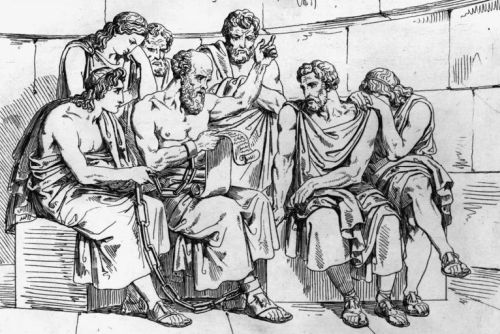
Socrates talks to his friends in his last hours. Unknown artist Photo Pintered
Plato lets Socrates go on to describe the democratic man. The resemblance to "The Housewifes of the Suburbs" and their rebellious sons is striking: "His origin is as follows: - He is often the young son of a brave father, who dwells in an ill-governed city, of which he declines the honours and offices, and will not go to law, or exert himself in any way, but is ready to waive his rights in order that he may escape trouble."
"The character of the son begins to develope when he hears his mother complaining that her husband has no place in the government, of which the consequence is that she has no precedence among other women. Further, when she sees her husband not very eager about money, and instead of battling and railing in the law courts or assembly, taking whatever happens to him quietly; and when she observes that his thoughts always centre in himself, while he treats her with very considerable indifference, she is an-noyed, and says to her son that his father is only half a man and far too easy-going: adding all the other complaints about her own ill-treatment which women are so fond of rehearsing."
"And you know, I said, that the old servants also, who are supposed to be attached to the family, from time to time talk privately in the same strain to the son; and if they see any one who owes money to his father, or is wronging him in any way, and he fails to prosecute them, they tell the youth that when he grows up he must retaliate upon people of this sort, and be more of a man than his father."
"The result is that the young man, hearing and seeing all these things - hearing, too, the words of his father, and having a nearer view of his way of life, and making comparisons of him and others - is drawn opposite ways: while his father is watering and nourishing the rational principle in his soul, the others are encouraging the passionate and appetitive; and he being not originally of a bad nature, but having kept bad company, is at last brought by their joint influence to a middle point, and gives up the kingdom which is within him to the middle principle of contentiousness and passion, and becomes arrogant and ambitious."
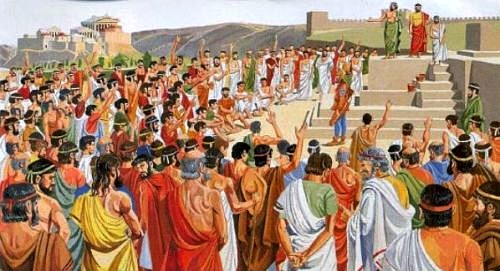
Meeting of a Greek People's Assembly. Unknown artist Photo Swamp-Lynx
"Yes, I said, he lives from day to day in-dulging the appetite of the hour; and some-times he is lapped in drink and strains of the flute; then he becomes a water-drinker, and tries to get thin; then he takes a turn at gymnastics; sometimes idling and neglecting everything, then once more living the life of a philosopher; often he is busy with politics, and starts to his feet and says and does whatever comes into his head; and, if he is emulous of any one who is a warrior, off he is in that direction, or of men of business, once more in that. His life has neither law nor order; and this distracted existence he terms joy and bliss and freedom; and so he goes on."
Therefore, Plato believes that democracy will inevitably give way to tyranny. Socrates asks: Say then, my friend, In what manner does tyranny arise? - That it has a democratic origin is evident.
"And democracy has her own good, of which the insatiable desire brings her to dissolution?" - "What good?" - "Freedom, I replied."
In much the same way that a body's antibodies - which in itself are a good thing - can overreact and bring death to a human being, so the unstoppable desire for freedom can bring down democracy, turning against its own.
Socrates explains: "When a democracy which is thirsting for freedom has evil cup-bearers presiding over the feast, and has drunk too deeply of the strong wine of freedom, then, unless her rulers are very amenable and give a plentiful draught, she calls them to account and punishes them, and says that they are cursed oligarchs."
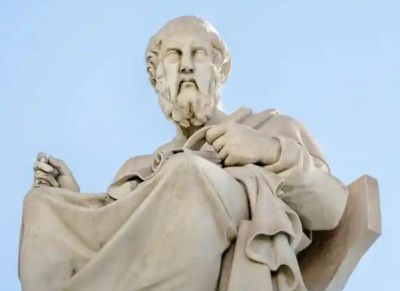
Statue of Plato. Photo The Guardian.
Miraculously - two and a half millennia before our time - he foretold the dissolution of Western culture by undermining any authority: "the father grows accustomed to descend to the level of his sons and to fear them, and the son is on a level with his father, he having no respect or reverence for either of his parents; and this is his freedom" - "and the stranger is quite as good as either."
In the democratic state, the scholars despise those who pay them, and the young despise the elderly: "In such a state of society the master fears and flatters his scholars, and the scholars despise their masters and tutors; young and old are all alike;" Socrates lets Plato continue, "and the young man is on a level with the old, and is ready to compete with him in word or deed; and old men condescend to the young and are full of pleasantry and gaiety; they are loth to be thought morose and authoritative, and therefore they adopt the manners of the young."
"And above all, I said, and as the result of all, see how sensitive the citizens become; they chafe impatiently at the least touch of authority, and at length, as you know, they cease to care even for the laws, written or unwritten; they will have no one over them."
"Such, my friend, I said, is the fair and glorious beginning out of which springs tyranny," stated Socrates.
7. PRO Demokrati
If society is to be led by an almigh-ty intellectual elite and ordi-nary citizens just have to take care of their work and private lives then they will lose enthusiasm and ini-tiative as a result of boring or re-strictive routines.
Today, society is completely diffe-rent from Plato's Athens. In the an-cient Greek cities each citizen had a fixed position in the hierarchy, and the technological and social development was minimal. Athens was ethnically homogeneous, po-pulated by Hellenians only.

A politician meets with the voters.
Modern society, however, are con-tinually developing. In our time is a huge geographical and social mo-bility. Today's society is multicultu-ral with many ethnic and religious groups.
If we do not give people the oppor-tunity to express their opinions and cast their votes, they will not feel, that this society is theirs. We will risk, that the nation falls apart into different groups.
It is not necessarily bad to dis-agree. There will always be diffe-rences between people, and it is precisely, when these opposing views clash, the new, the right so-lutions will come into existence.
The principle of democratic deci-sion making makes possible a peaceful compromise between op-posing political groups and their i-deas.
The rivalizing groups meet and exchange views on, what each of them considers particularly im-portant. Based on this they set up a list of subjects for negotiation. They may eventually develop a joint action program, which in-cludes the main points from each group, or compromises on par-ticular points that both sides re-gard as important.
This principle of democratic decision-making has for many years really solved numerous dis-putes in a peaceful way.
The American democracy has not experienced significant unrest sin-ce the civil war ended in 1865.
The European democracies have not experienced any significant turmoil since the Second World War ended in 1945.
For several hundred years nothing has indicated that democracies should be followed by dictator-ships, rather, vice versa, as wit-nessed in Greece, Spain, Portugal and Eastern Europe.

The Carnation Revolution in Portugal 1974.
In Portugal, the world's longest existing dictatorship was over-thrown by the military in 1974.
Also in 1974 the polytechnic stu-dents in Athens demonstrated a-gainst the Papadopulus dictator-ship. Shortly after it was over-thrown by the military.
The Polish shipyard workers went on strike in 1982 organised by their workers union, Solidarity, with Lech Walesa as their leader. It was the first blow to the socialist sy-stems in Eastern Europe in mo-dern times.
Romanian dictator Nicolae Ceau-sescu and his wife Elena were ar-rested after a military uprising in 1989.
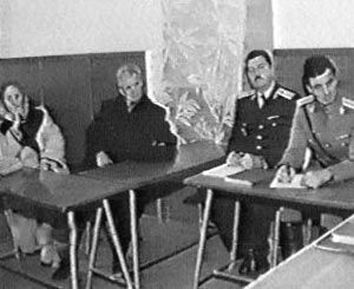
The former Romanian dictator and his wife are on trial in a military base outside Bucharest.
Following a brief trial on a military base outside Bucharest, the 2. day of Christmas 1989, they were exe-cuted by a firing squad. This en-ded the Romanian dictatorship, and paved the way for democracy in Romania.
The Soviet Union and its socialist system fell apart in 1991.

Boris Yeltsin's finest moment stopping a coup against premier Mikhail Gorbachev standing on a tank. Photo cato.org.
It cannot be denied, that the peop-les of the World yearn for freedom and democracy. One by one the dictatorships fall and democracy takes over.
Democracy is indeed a great suc-cess, and it certainly did not led to chaos and dictatorship, as Plato predicted.
7. CONTRA Demokrati
Democracy leads to disagree-ments and conflicts among the people, which is a fundamental evil and should be avoided.
The citizens engage emotionally in different potentiel solutions of the problems of society, different poli-tical lines. When their prefferred solutions do not prevail, they will feel frustrated and angry.
Who did not experience to have the good atmosphere at a festive gathering with friends or neigh-bours destroyed by political dis-cussions about subjects, nobody really know anything about? Dis-cussions, which became still more excited and less and less factual as the evening progressed?
It can be difficult not to send a thought to Ludvig Holberg and his "Political Jugmaker".
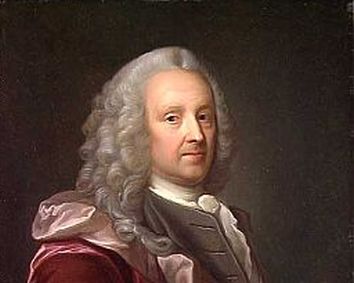
Ludvig Holberg, painting by Johan Roselius 1752.
That democracy leads to disagree-ments and conflicts is easy to spot. We can just look in the television how the politicians accuse each other, interrupting each other when they are discussing. They seem to be more interested in promoting the differences in their positions, than they are in finding common solutions to the problems of the nation.
Hitler came to power in connection with unrest and subsequent demo-cratic elections. Which supports Plato's theory that democracy will be followed by tyranny.
The developing countries have many examples of, that chaotic conditions in democracies have created fertile ground for sub-sequent dictatorial regimes.
In 1985, the military regime in Su-dan was replaced by a democratic government. The subsequent e-lection led immediately to anarchy and chaos, just as Plato predicted. The turbulent democracy were quickly replaced by a new and even more brutal military dictator-ship.
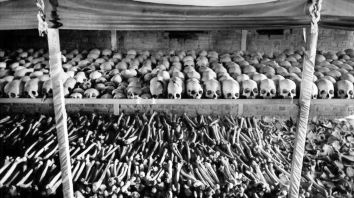
The genocide of the Tutsis in 1994.
After pressure from Western go-vernments the African nation of Rwanda in 1992 established a democratic multiparty system. However the new political parties were covers for ethnic groups, which established murderous militias. Contradictions between these political parties and their hinterlands created the basis for the events that led to the genocide of the Tutsis in 1994.
In Kenya, unrest in connection with precisely a democratic election, have led to that several hundred men, women and children have been burned or chopped to death.
An unemployed Tunisian graduate said: "In Tunis, we have 25% un-employment. If we held elections under such circumstances, it would result in a fundamentalist govern-ment, violence and terror, just as in Algiers. First we must create a good economy, and then we can start thinking about elections."
A political party must have a fixed place among the voters, a foun-dation somewhere in the society, otherwise they will never get e-nough votes. Some parties ad-dress workers, civil servants and other employees in government organisations, other target pen-sioners and ethnic minorities, some are representing the self-employed, some parties stress their good cooperation with the big international companies and so on.
A democratically elected govern-ment must be loyal to its basic de-dicated group of voters and stand up to at least some of the promis-es, they have made. There-fore no democratic government can fully represent the interest of the whole nation.
According to the Security compa-ny, Kroll Associates, the democra-tic South Africa is rated as one of the most violent places in the world, which are not war zone.
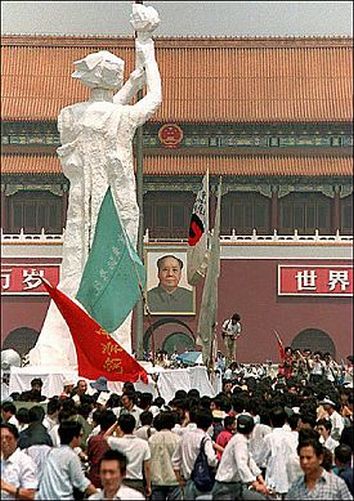
The Goddess of Democracy in Tian An Men Square.
In modern times, China has en-joyed an almost explosive ec-onomic growth with double-digit growth rates. This is only possible, because the country is not a de-mocracy. Something like the one-child policy would never have sur-vived a democratic election.
8. Literature
Criticisms and Benefits of Monarchy The International Commission on Nobility and Royalty.The History of the Peloponnesian War - By Thucydides translated by Richard Crawley.
Plato and the disaster of democracy Classical Wisdom Weekly.
Plato's Arguments Against Democracy Graham Hancock.
Criticism of democracy Wikipedia.
Plato's Critique of Democracy and Contemporary Politics Politics in theory and practice.
The Republic by Plato translated by Benjamin Jowett - Gutenberg.
Republic (Plato) Wikipedia.
Education in Plato's Republic - Arial Dillon Character Education.
Excerpt #11 Plato's "Ship Of State" - Gregory Stack Pole Into the Clarities.
Plato's Chariot Allegory translated by Benjamin Jowett - John Uebersax PhD.